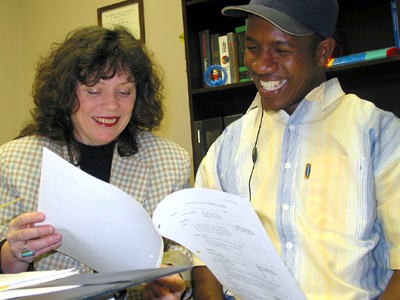JACKSON, Miss.—Adrian Benson arrived at Methodist Rehabilitation Center in Jackson reeling from the news that a car wreck had left him a paraplegic.
So he was only half listening as Methodist staff tried to teach him how to stay healthy once he got home. “I was hearing it, but I wasn’t hearing it,” admits the 30-year-old Canton resident. “I was just ready to get out of the hospital. Being paralyzed … it took some time for that to sink in.”
Once it did, Benson came to regret not learning more about his condition when he had the chance. So he jumped at the opportunity to be a part of a Methodist study that examines whether post-discharge education and support might prevent complications, improve the quality of life and reduce long-term health care costs for spinal cord injury patients.
THANKS (Transitioning Home and Acquiring Necessary Knowledge about Self-care) is funded by the Mississippi Department of Rehabilitation Services and administered by Methodist research nurse Paula Russum-Hawkins.
Russum-Hawkins said she begins calling participants about a week after they get home from the hospital and spends the next six months tutoring them on a variety of health topics.
“I call them once a week for four weeks, every other week for another four weeks and then monthly for four months, for a total of 10 visits. The program includes 10 education modules, and during the last call I do a comprehensive review all the information and a final exam.”
Russum-Hawkins keeps participants apprised of issues related to the circulatory system, respiratory care, range of motion exercises, mobility and positioning, bladder and bowel management and skin care. She also helps patient recognize the symptoms of secondary complications, many of which can be deadly.
“I was talking to one man and he was sweating, had nausea and increased spasms and I told him to get off the phone with me and call his urologist now,” remembered Russum-Hawkins. “It turned out he had a huge bladder stone. If he hadn’t had it removed, he could have had a stroke from high blood pressure or it could have caused a tear in his urethra.”
More than 70 participants ages 15 to 80 took part in the first year of THANKS and
results so far are encouraging, Russum-Hawkins said. “Our preliminary findings show marked improvement in self-care knowledge over time and the participants highly recommended and commended the THANKS program.”
Russum-Hawkins said the study will continue to enroll new participants, as well as monitor those who’ve already completed the education modules. “We will conduct a one-year follow-up with people enrolled in the first year of the study to find out about secondary complications and determine their satisfaction with life, perceived health, employment status, adjustment to injury and community reintegration.”
Sharon Harris, 25, a quadriplegic who lives in Vaughn, believes her involvement with the study has helped her stay healthy. She says much of the credit goes to Russum-Hawkins because she’s an always-on-call information source. “I don’t care what time it is or what she has to do, Paula will always talk to me or call me back if I leave a message.” Harris said.
Harris said that’s important because people often have a hard time absorbing all they need to know while they’re still in the hospital. “You are so overwhelmed that when you first get home you forget everything.”
And you often don’t know what you need to ask until you’re faced with a new future, Benson said. “When you are paralyzed, it is like starting over. Having someone who can sympathize and relate to you is like a blessing out of the sky. When I have a question, I tell my wife: ‘I’ll call nurse Paula. She’ll tell me.’ ”

